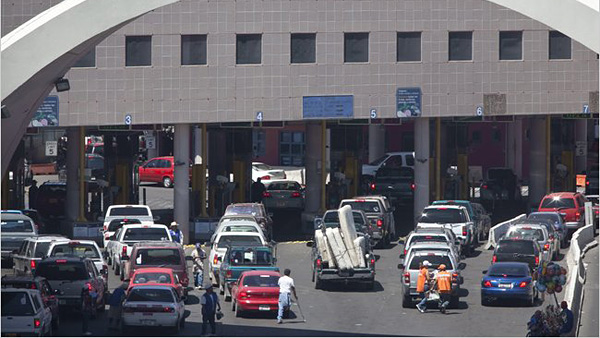
|  |  |  Americas & Beyond | October 2009 Americas & Beyond | October 2009  
U.S. and Mexico Agree on Shift in Drug Trials
 Randal C. Archibold - New York Times Randal C. Archibold - New York Times
go to original
October 31, 2009


| | The Nogales border crossing, the busiest in Arizona, is ground zero for an arrangement to refer some drug cases to Mexico. (Mark Henle/Arizona Republic) |  |
Nogales, Ariz. — In a break with a longstanding drug enforcement practice, the authorities in the United States and Mexico have agreed to have some Mexicans caught smuggling drugs into the United States returned to Mexico for prosecution.

Last weekend, for the first time, a suspected marijuana smuggler, found at the border with 44 pounds of the drug hidden in his car, was turned over to Mexican prosecutors. He could be prosecuted under Mexican law for felony export violations and other charges.

The new approach is a step toward resolving a nettlesome problem at the border: very often, Mexicans caught smuggling drugs do not face prosecution in the United States for that crime.

The reasons vary, but federal prosecutors here and across the Southwest have often rejected cases involving relatively small amounts of drugs, usually less than 500 pounds of marijuana, because of the large volume of those cases and limited resources to handle them. In recent years, prosecutions for immigration violations have surged while drug prosecutions have declined.

Under the new arrangement, agreed upon several weeks ago, the authorities in the United States said they would closely monitor the cases referred to Mexico.

The justice system in Mexico has been plagued by chronic problems, including lost or uncollected evidence and accusations of police and prosecutorial misconduct, incompetence and overcrowded prisons. But the Mexican government, with the assistance of the United States, is pushing through changes intended to make the Mexican justice system more accountable.

Dennis Burke, the United States attorney in Arizona, described the border agreement as a sign of “our effort to enhance cooperation between the U.S. and Mexico on prosecuting drug trafficking cases.”

The new approach is being tested on cases arising from the border crossing here, the busiest in Arizona and a hotbed of drug smuggling. If deemed a success, it may be expanded to other parts of the 2,000-mile Mexican border. The crossing here was chosen, officials said, because its controlled setting makes it easier to prove to Mexican prosecutors that any suspected smugglers crossed into the United States with the contraband.

In the fiscal year ending last month, Immigration and Customs Enforcement opened 646 drug smuggling cases arising from the Nogales port of entry, though it was not clear how many were referred to prosecutors.

Referrals will be decided case by case, officials said.

The first referral, last weekend, involved Eleazar González-Sánchez, 27, of Sonora, Mexico. He was detained, Customs and Border Protection officers said, after they found the marijuana hidden in a compartment in the trunk of the car he was driving.

Mr. González-Sánchez was turned over to immigration agents, who, after consulting with federal prosecutors in the United States, informed Mexico’s attorney general’s office.

Mexican prosecutors reviewed the evidence, including sworn affidavits from United States law enforcement officials, and agreed to accept the case, taking custody of Mr. González-Sánchez and a sample of the marijuana for use in the prosecution.

Although Mr. González-Sánchez’s case is the kind prosecutors here would have routinely rejected as too small, federal officials said there was no longer a policy of automatically rejecting small cases. Federal prosecutors in the United States would not say why they declined to prosecute the case themselves, referring comment to the immigration agency.

Matthew C. Allen, the special agent in charge of that agency in Arizona, suggested it might have been difficult to gain a smuggling conviction if prosecutors could not prove that Mr. González-Sánchez had knowingly transported the drugs with the intent to distribute them.

Though Mr. González-Sánchez was not referred to local prosecutors, the state and local authorities in Arizona have frequently turned down cases rejected by federal prosecutors, complaining of dwindling resources. The county attorney here, George Silva, said he had two prosecutors assigned to drug cases whereas there was work for several.

As a result, suspected smugglers have often ended up being deported without facing drug charges and “the consequences of that illegal conduct,” Mr. Allen said. “That’s why it’s important to have a tool like this.”

In the fiscal year ending in October 2008, officers at Arizona’s border crossings seized close to 75,000 pounds of illicit narcotics, with an estimated street value of more than $235 million. Marijuana made up the bulk of the seizures, at 71,000 pounds.

Mr. Silva said that he welcomed the new cooperation with Mexico and suggested that Mr. González-Sánchez would probably not have faced charges in Santa Cruz County, had the case been referred to him instead of the Mexican authorities. He said that he doubted the federal government would send big cases to Mexico, but that the program could still make a difference.

“So many cases like this fall through the cracks and there is no consequence,” Mr. Silva said. “But we will wait and see how these prosecutions take place. At least it’s something, as opposed to nothing.”
|

 |
|  |



